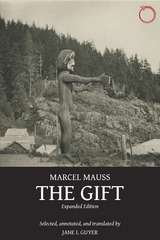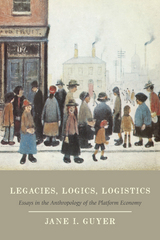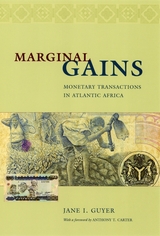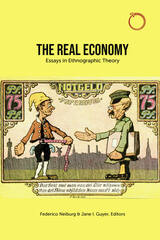5 books by Guyer, Jane

Dahomean Narrative
A Cross-Cultural Analysis
Melville J. Herskovits and Frances S. Herskovits
Northwestern University Press, 1998
This new edition brings back into print one of the classics in scholarly analysis and translation, written by one of the luminaries of American cultural anthropology. Melville Herskovits and his wife and collaborator Frances spent over twenty years studying the social networks, religion, music, and oral traditions of the peoples of West Africa and their descendants in the New World. Dahomey, the site of their major African work, is in the country now known as Benin.
Published as a companion piece to Northwestern University Press's West African Folktales, Dahomean Narrative provides the basic texts of material collected in the field, and shows how they were collected, analyzed, and theorized in the anthropological and folklore disciplinary traditions of Herskovits's day. The result is a wide-ranging collection, culled from an entire narrative tradition, that remains unique among anthropological publications.
Published as a companion piece to Northwestern University Press's West African Folktales, Dahomean Narrative provides the basic texts of material collected in the field, and shows how they were collected, analyzed, and theorized in the anthropological and folklore disciplinary traditions of Herskovits's day. The result is a wide-ranging collection, culled from an entire narrative tradition, that remains unique among anthropological publications.
[more]

The Gift
Expanded Edition
Marcel Mauss
HAU, 2016
Scan down a list of essential works in any introduction to anthropology course and you are likely to see Marcel Mauss’ masterpiece, The Gift. With this new translation, Mauss’ classic essay is returned to its original context, published alongside the works that framed its first publication in the 1923–24 issue of L’Année Sociologique. With a critical foreword by Bill Maurer and a new introduction by translator Jane Guyer, this expanded edition is certain to become the standard English version of the essay—a gift that keeps on giving.
Included alongside the “Essay on the Gift” are Mauss’ memorial accounts of the work of Émile Durkheim and his colleagues who were lost during World War I, as well as his scholarly reviews of influential contemporaries such as Franz Boas, J. G. Frazer, Bronislaw Malinowski, and others. Read in the context of these additional pieces, the “Essay on the Gift” is revealed as a complementary whole, a gesture of both personal and political generosity: Mauss’ honor for his fallen colleagues; his aspiration for modern society’s recuperation of the gift as a mode of repair; and his own careful, yet critical, reading of his intellectual milieu. The result sets the scene for a whole new generation of readers to study this essay alongside pieces that exhibit the erudition, political commitment, and generous collegial exchange that first nourished the essay into life.
Included alongside the “Essay on the Gift” are Mauss’ memorial accounts of the work of Émile Durkheim and his colleagues who were lost during World War I, as well as his scholarly reviews of influential contemporaries such as Franz Boas, J. G. Frazer, Bronislaw Malinowski, and others. Read in the context of these additional pieces, the “Essay on the Gift” is revealed as a complementary whole, a gesture of both personal and political generosity: Mauss’ honor for his fallen colleagues; his aspiration for modern society’s recuperation of the gift as a mode of repair; and his own careful, yet critical, reading of his intellectual milieu. The result sets the scene for a whole new generation of readers to study this essay alongside pieces that exhibit the erudition, political commitment, and generous collegial exchange that first nourished the essay into life.
[more]

Legacies, Logics, Logistics
Essays in the Anthropology of the Platform Economy
Jane I. Guyer
University of Chicago Press, 2016
Legacies, Logics, Logistics brings together a set of essays, written both before and after the financial crisis of 2007–08, by eminent Africanist and economic anthropologist Jane I. Guyer. Each was written initially for a conference on a defined theme. When they are brought together and interpreted as a whole by Guyer, these varied essays show how an anthropological and socio-historical approach to economic practices—both in the West and elsewhere—can illuminate deep facets of economic life that the big theories and models may fail to capture.
Focusing on economic actors—whether ordinary consumers or financial experts—Guyer traces how people and institutions hold together past experiences (legacies), imagined scenarios and models (logics), and situational challenges (logistics) in a way that makes the performance of economic life (on platforms made of these legacies, logics, and logistics) work in practice. Individual essays explore a number of topics—including time frames and the future, the use of percentages in observations and judgments, the explanation of prices, the coexistence of different world currencies, the reapplication of longtime economic theories in new settings, and, crucially, how we talk about the economy, how we use stable terms to describe a turbulent system. Valuable as standalone pieces, the essays build into a cogent method of economic anthropology.
Focusing on economic actors—whether ordinary consumers or financial experts—Guyer traces how people and institutions hold together past experiences (legacies), imagined scenarios and models (logics), and situational challenges (logistics) in a way that makes the performance of economic life (on platforms made of these legacies, logics, and logistics) work in practice. Individual essays explore a number of topics—including time frames and the future, the use of percentages in observations and judgments, the explanation of prices, the coexistence of different world currencies, the reapplication of longtime economic theories in new settings, and, crucially, how we talk about the economy, how we use stable terms to describe a turbulent system. Valuable as standalone pieces, the essays build into a cogent method of economic anthropology.
[more]

Marginal Gains
Monetary Transactions in Atlantic Africa
Jane I. Guyer
University of Chicago Press, 2004
In America, almost all the money in circulation passes through financial institutions every day. But in Nigeria's "cash and carry" system, 90 percent of the currency never comes back to a bank after it's issued. What happens when two such radically different economies meet and mingle, as they have for centuries in Atlantic Africa?
The answer is a rich diversity of economic practices responsive to both local and global circumstances. In Marginal Gains, Jane I. Guyer explores and explains these often bewildering practices, including trade with coastal capitalism and across indigenous currency zones, and within the modern popular economy. Drawing on a wide range of evidence, Guyer demonstrates that the region shares a coherent, if loosely knit, commercial culture. She shows how that culture actually works in daily practice, addressing both its differing scales of value and the many settings in which it operates, from crisis conditions to ordinary household budgets. The result is a landmark study that reveals not just how popular economic systems work in Africa, but possibly elsewhere in the Third World.
The answer is a rich diversity of economic practices responsive to both local and global circumstances. In Marginal Gains, Jane I. Guyer explores and explains these often bewildering practices, including trade with coastal capitalism and across indigenous currency zones, and within the modern popular economy. Drawing on a wide range of evidence, Guyer demonstrates that the region shares a coherent, if loosely knit, commercial culture. She shows how that culture actually works in daily practice, addressing both its differing scales of value and the many settings in which it operates, from crisis conditions to ordinary household budgets. The result is a landmark study that reveals not just how popular economic systems work in Africa, but possibly elsewhere in the Third World.
[more]

The Real Economy
Essays in Ethnographic Theory
Edited by Federico Neiburg and Jane I. Guyer
HAU, 2019
This collection highlights a key metaphor in contemporary discourse about economy and society. The contributors explore how references to reality and the real economy are linked both to the utopias of collective well-being, supported by real monies and good economies, and the dystopias of financial bubbles and busts, in which people’s own lives “crash” along with the reality of their economies.
An ambitious anthropology of economy, this volume questions how assemblages of vernacular and scientific realizations and enactments of the economy are linked to ideas of truth and moral value; how these multiple and shifting realities become present and entangle with historically and socially situated lives; and how the formal realizations of the concept of the “real” in the governance of economies engage with the experiential lives of ordinary people. Featuring essays from some of the world’s most prominent economic anthropologists, The Real Economy is a milestone collection in economic anthropology that crosses disciplinary boundaries and adds new life to social studies of the economy.
An ambitious anthropology of economy, this volume questions how assemblages of vernacular and scientific realizations and enactments of the economy are linked to ideas of truth and moral value; how these multiple and shifting realities become present and entangle with historically and socially situated lives; and how the formal realizations of the concept of the “real” in the governance of economies engage with the experiential lives of ordinary people. Featuring essays from some of the world’s most prominent economic anthropologists, The Real Economy is a milestone collection in economic anthropology that crosses disciplinary boundaries and adds new life to social studies of the economy.
[more]
READERS
Browse our collection.
PUBLISHERS
See BiblioVault's publisher services.
STUDENT SERVICES
Files for college accessibility offices.
UChicago Accessibility Resources
home | accessibility | search | about | contact us
BiblioVault ® 2001 - 2024
The University of Chicago Press









